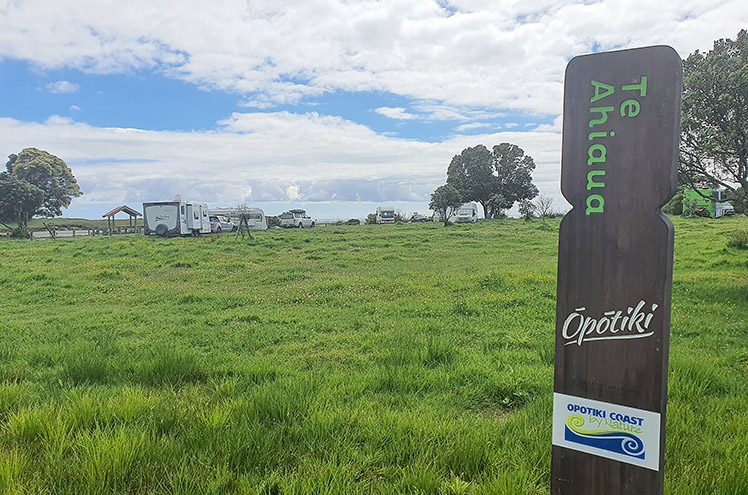Submitters speak out against camping at Te Ahiaua Reserve

SIGNIFICANT SITE: Eastern Bay Forest and Bird raised concerns about the effects of multinight campers on the delicate habitat of the Waiohahe River estuary, including the capacity of the septic system of the public toilet. Photo Diane McCarthy E5037-02
Diane McCarthy
Two submitters have asked Ōpōtiki District Council not to allow overnight camping at Te Ahiaua Reserve.
At a hearing for the council’s draft Freedom Camping Bylaw, Eastern Bay Forest & Bird’s Linda Conning and Waiotahe resident Elizabeth McAdam spoke about the impact of campers on the estuary, locally known as the Pipi Beds.
Mrs Conning spoke on the submission made by Eastern Bay Forest and Bird secretary Lynne Hickling, which said the Waiotahe River estuary was considered a habitat of considerable importance to the biodiversity of the Eastern Bay.
She raised concerns about potential septic discharges from the public toilet so close to the delicate habitat and the pressure that multi-night campers would put on the facilities over the busy summer months.
She understood the septic tank was regularly pumped but still had concerns about the capacity and the likelihood of the toilet exceeding that.
“We request that the council monitors either the levels within the system or number of users to establish if the current system can cope with influxes at busy times.
“If this is not the case, the camping ground may need to be shut down to allow the toilets to be used by day users and passersby only, or the septic system may need to be upgraded.”
She was also concerned campers might dump grey water – water from washing dishes, laundry or showers - directly onto the ground, litter, disturb wildlife or allow their dogs to disturb wildlife.
Ms McAdams said although she was not against freedom camping, the number of campers at the reserve meant locals felt they were not able to use the amenity over the summer.
“The pipi beds are continually overloaded by people staying for more than three days. People camp in prohibited areas as well, which goes unchecked.
“Because of this, the ratepayers of the area cannot use that public reserve. I’ve had people say to me that they feel intimidated going there with their kids just because of the volume of people.”
She suggested a small nightly charge would be appropriate to cover the cost of toilet cleaning, rubbish disposal and grass cutting.
"I see little evidence of these holidaymakers contributing to the local economy in any significant way except perhaps purchasing some groceries.”
A representative of the New Zealand Motor Caravan Association, which made lengthy submissions to over two rounds of consultations had been scheduled to speak at the hearing.
They had raised concerns about the reasons for prohibiting freedom camping in some areas, drawing the council’s attention to a legal case it had taken to the High Court that had invalidated the Queenstown Lakes District Council’s Freedom Camping Bylaw.
However, parks, reserves and harbour operations manager Garry Page said he had answered a lot of queries they had about the bylaw and the organisation had been satisfied with the answers they had received.
